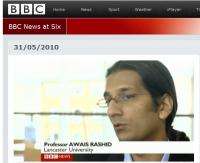Software developers tackle child grooming on the net

(PhysOrg.com) -- Four out of five children can't tell when they are talking to an adult posing as a child on the internet, according to researchers working on software to track paedophiles online.
Computer Scientists at Lancaster University have been working on a tool which can work out a person’s age and gender using language analysis techniques. They hope it will eventually be used to help police and law enforcement agencies spot when an adult in a chartroom is masquerading as a child as part of the victim "grooming" process.
For several months, groups of children and teenagers from the Queen Elizabeth School, Kirkby Lonsdale, Cumbria, have been taking part in experiments designed to provide the researchers with exactly the kind of informal web chat they need to help improve the accuracy of their software.
But the 350 students have also unwittingly been taking part in an experiment to find out if they know when they are talking to adults posing as children online.
So far the results show that even pupils as old as 17 struggled to tell the difference.
-- Overall only 18% of children taking part in the experiment guessed correctly
-- Approximately 4 out of 5 thought they were chatting to a teenager when in fact it was an adult.
-- Girls were better than the boys, 22% of the girls guessed correctly, only 16% of the boys did.
The computer software did significantly better correctly working out whether web chat was written by a child or an adult in 47 out of 50 cases - even when the adult was pretending to be a child.
Recent years have seen a rapid rise in the number and use of online social networks. These social networks pose two significant risks in terms of child exploitation: paedophiles predating on children in chat rooms and distributing and sharing child abuse media through online file sharing.
Experts at Lancaster, Swansea and Middlesex Universities have joined forces with specialist UK law enforcement to develop a project to help address these risks by harnessing developments in technology and to ensure that such developments maintain ethical practices.
Eventually, researchers believe the software could be used not only to identify adults posing as children but also to pick up on the ‘Stylistic foot prints’ of paedophiles and trail them as they move around the internet.
Once fully developed, these techniques will be automated, potentially freeing up police time and adding to the expertise already deployed within investigations which identify and locate child sex offenders.
Lead researcher, Professor Awais Rashid of Lancaster University's Department of Computing, said: "Paedophiles often pose as children online and our research indicates that children don’t find it easy to spot an adult pretending to be a child.
“In our analysis we found that 4 out of 5 children across the school got it wrong. Interestingly the strategies they use to detect who they are talking to are also the ones that lead them to make wrong decisions - they rely on the subject matter, use of slang and even something as simple as whether the individual said he or she was an adult or a child. This really highlights the need for a safety net of some sort.
“We hope to develop an automated system which can pick up on quirks of language particular to a certain age group. These language patterns can help us to expose adults that seek to groom children online, by posing as children in chat rooms for example.
“The school has been brilliant, putting enormous effort into the project which has provided us with valuable data and also given the pupils here an important insight into internet safety.”
Alison Wilkinson, Deputy Head of the Queen Elisabeth School, said: “QES is really committed to keeping its students safe beyond the school gates and beyond the school day. We are concerned about the dangers our pupils face when they’re online and have welcomed the opportunity to help the project at the same time as raising pupils’ awareness of the risks. It has been chilling to watch them being taken in by adults masquerading as teenagers.”
More information: For more information on project Isis please go to: www.comp.lancs.ac.uk/isis/
Provided by Lancaster University
















